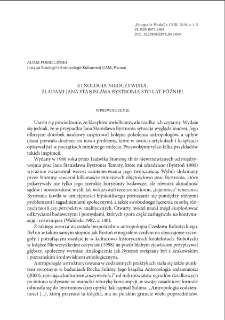- Search in all Repository
- Literature and maps
- Archeology
- Mills database
- Natural sciences
Advanced search
Advanced search
Advanced search
Advanced search
Advanced search

Object
Title: Etnologia nieoczywista. Śladami Jana Stanisława Bystronia sto lat później
Subtitle:
Unobvious ethnology. In the footsteps of Jan Stanisław Bystroń a hundred years later ; Etnografia Polska 63 z. 1-2 (2019)
Publisher:
Instytut Archeologii i Etnologii Polskiej Akademii Nauk
Place of publishing:
Description:
Type of object:
Abstract:
Over a hundred years ago, Jan Stanisław Bystroń became the head of the Department of Ethnology at the University of Poznań (original name Wszechnica Piastowska). He has left a huge collection of books and articles as his scientific achievements, which still inspire new generations of ethnologists and social researchers. His most intense scientific activity was during the inter-war period, in which first as a professor at the University of Poznań, and then at the Jagiellonian University and the University of Warsaw, he co-created the foundations of ethnological sciences in Poland. This article focuses on two main areas: institutional (vision of ethnology as academic science) and issues of cultural heritage. The presented text does not refer to the entire academic output of Bystroń, but above all concentrates on the years 1919–1925 – the period when he managed the Department of Ethnography in Poznań. For Bystroń it was a time of intensive academic work and the beginning of formulating many research ideas that evolved later. Ethnology, in the understanding of Bystroń, has made a kind of reorientation in the approach to the problems of the nation, folk, regionalism, language phenomena and history (for example Polish folk history). Many threads are also considered pioneering and sometimes controversial today. His theory of culture is also a pretext for reflection on the contemporary dilemmas of Polish ethnology, such as: the disciplinary identity, the boundaries between sciences, the role of cultural capital and knowledge transfers
Relation:
Volume:
Issue:
Start page:
End page:
Detailed Resource Type:
Format:
Resource Identifier:
oai:rcin.org.pl:113632 ; 0071-1861 ; doi:10.23858/EP63.2019.005
Source:
IAiE PAN, call no. P 325 ; IAiE PAN, call no. P 326 ; IAiE PAN, call no. P 327 ; click here to follow the link
Language:
Rights:
Terms of use:
Copyright-protected material. May be used within the limits of statutory user freedoms
Digitizing institution:
Institute of Archaeology and Ethnology of the Polish Academy of Sciences
Original in:
Library of the Institute of Archaeology and Ethnology of the Polish Academy of Sciences
Access:
Object collections:
- Digital Repository of Scientific Institutes > Partners' collections > Institute of Archeology and Ethnology PAS > Institute Publications
- Digital Repository of Scientific Institutes > Partners' collections > Institute of Archeology and Ethnology PAS > Institute Publications > Current Journals
- Digital Repository of Scientific Institutes > Literature > Journals/Articles
- Digital Repository of Scientific Institutes > Partners' collections > Institute of Archeology and Ethnology PAS > Institute Publications > Current Journals > Etnografia Polska
Last modified:
Feb 2, 2022
In our library since:
Feb 17, 2020
Number of object content downloads / hits:
1277
All available object's versions:
https://rcin.org.pl./publication/142035
Show description in RDF format:
Show description in RDFa format:
Show description in OAI-PMH format:
| Edition name | Date |
|---|---|
| Pomieciński, Adam, 2019, Etnologia nieoczywista. Śladami Jana Stanisława Bystronia sto lat później | Feb 2, 2022 |
Objects Similar
Tazbir, Janusz (1927–2016) Tymieniecki, Kazimierz (1887–1968) Garbacik, Józef (1907–1976) Reychman, Jan (1910–1975)
Tomicki, Ryszard
Kozhevnikova, Magdalena
Calvo, Daniela
Roeske, Małgorzata
Kowalska, Małgorzata Zofia

 INSTYTUT ARCHEOLOGII I ETNOLOGII POLSKIEJ AKADEMII NAUK
INSTYTUT ARCHEOLOGII I ETNOLOGII POLSKIEJ AKADEMII NAUK
 INSTYTUT BADAŃ LITERACKICH POLSKIEJ AKADEMII NAUK
INSTYTUT BADAŃ LITERACKICH POLSKIEJ AKADEMII NAUK
 INSTYTUT BADAWCZY LEŚNICTWA
INSTYTUT BADAWCZY LEŚNICTWA
 INSTYTUT BIOLOGII DOŚWIADCZALNEJ IM. MARCELEGO NENCKIEGO POLSKIEJ AKADEMII NAUK
INSTYTUT BIOLOGII DOŚWIADCZALNEJ IM. MARCELEGO NENCKIEGO POLSKIEJ AKADEMII NAUK
 INSTYTUT BIOLOGII SSAKÓW POLSKIEJ AKADEMII NAUK
INSTYTUT BIOLOGII SSAKÓW POLSKIEJ AKADEMII NAUK
 INSTYTUT CHEMII FIZYCZNEJ PAN
INSTYTUT CHEMII FIZYCZNEJ PAN
 INSTYTUT CHEMII ORGANICZNEJ PAN
INSTYTUT CHEMII ORGANICZNEJ PAN
 INSTYTUT FILOZOFII I SOCJOLOGII PAN
INSTYTUT FILOZOFII I SOCJOLOGII PAN
 INSTYTUT GEOGRAFII I PRZESTRZENNEGO ZAGOSPODAROWANIA PAN
INSTYTUT GEOGRAFII I PRZESTRZENNEGO ZAGOSPODAROWANIA PAN
 INSTYTUT HISTORII im. TADEUSZA MANTEUFFLA POLSKIEJ AKADEMII NAUK
INSTYTUT HISTORII im. TADEUSZA MANTEUFFLA POLSKIEJ AKADEMII NAUK
 INSTYTUT JĘZYKA POLSKIEGO POLSKIEJ AKADEMII NAUK
INSTYTUT JĘZYKA POLSKIEGO POLSKIEJ AKADEMII NAUK
 INSTYTUT MATEMATYCZNY PAN
INSTYTUT MATEMATYCZNY PAN
 INSTYTUT MEDYCYNY DOŚWIADCZALNEJ I KLINICZNEJ IM.MIROSŁAWA MOSSAKOWSKIEGO POLSKIEJ AKADEMII NAUK
INSTYTUT MEDYCYNY DOŚWIADCZALNEJ I KLINICZNEJ IM.MIROSŁAWA MOSSAKOWSKIEGO POLSKIEJ AKADEMII NAUK
 INSTYTUT PODSTAWOWYCH PROBLEMÓW TECHNIKI PAN
INSTYTUT PODSTAWOWYCH PROBLEMÓW TECHNIKI PAN
 INSTYTUT SLAWISTYKI PAN
INSTYTUT SLAWISTYKI PAN
 SIEĆ BADAWCZA ŁUKASIEWICZ - INSTYTUT TECHNOLOGII MATERIAŁÓW ELEKTRONICZNYCH
SIEĆ BADAWCZA ŁUKASIEWICZ - INSTYTUT TECHNOLOGII MATERIAŁÓW ELEKTRONICZNYCH
 MUZEUM I INSTYTUT ZOOLOGII POLSKIEJ AKADEMII NAUK
MUZEUM I INSTYTUT ZOOLOGII POLSKIEJ AKADEMII NAUK
 INSTYTUT BADAŃ SYSTEMOWYCH PAN
INSTYTUT BADAŃ SYSTEMOWYCH PAN
 INSTYTUT BOTANIKI IM. WŁADYSŁAWA SZAFERA POLSKIEJ AKADEMII NAUK
INSTYTUT BOTANIKI IM. WŁADYSŁAWA SZAFERA POLSKIEJ AKADEMII NAUK




































